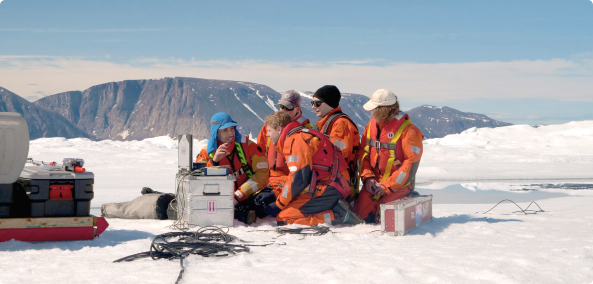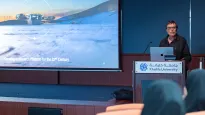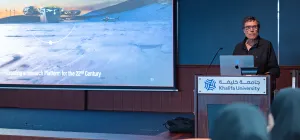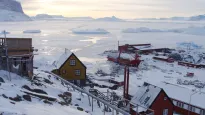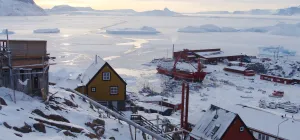Princess Elisabeth Station Leaves Brussels

Wednesday October 24th, the 80 containers carrying the Princess Elisabeth Station were loaded on to the Icelandic Samskip barge at the Port of Brussels. Under a polar wind blowing in from the North, a faithful public watched as the last containers left Brussels.
Organized by the Port of Brussels, a press conference was held in presence of Mrs. Laurence Bovy, President of the Port, Mrs. Brigitte Grouwels, Secretary of State in charge of the Port of Brussels, Mr. Pierre Guerin, CEO of the Compagnie Française de Navigation Rhénane (CFNR) and Mr. Thierry Touchais, Executive Director of IPF.
Through its activity, the Port of Brussels reduces the amount of carbon dioxide emissions in the capital of Belgium by roughly 90,000 tons annually. Practically, one barge is capable of replacing 80 road trucks. There is no doubt that sea and rivers represent an interesting alternative to roads and air routes. The transport sphere currently accounts for one of the four sectors (i.e. domestic, industry, agriculture and transport) releasing the most Greenhouse Gas in the world. It appears evident that ameliorations in this sector are to be encouraged and privileged.
Mr. Pierre Guerin explained and stressed that river freight is a conscious decision, based on political priorities. Choosing fluvial over road transport has proven to be advantageous given several situations:
- congestion at port terminals when loading and unloading containers,
- road congestion between Antwerp and Brussels
- clients wanting to keep an eye on their containers
- politicians wanting to take concrete action towards solving the general problem of obstruction
In line with IPF's objective of sustainability for the Princess Elisabeth Antarctic project, the containers are thus being sent by barges to Antwerp, and then from there to Antarctica aboard the Russian ice-class cargo ship named IVAN PAPANIN. As Thierry Touchais so rightly reminded us in his speech, climate change is above all a problem linked to energy use and production. "The alternative that river transport offers to road freight is highly relevant if we wish to reduce the contribution of this sector [transport] to Greenhouse Gas Emissions."
Download